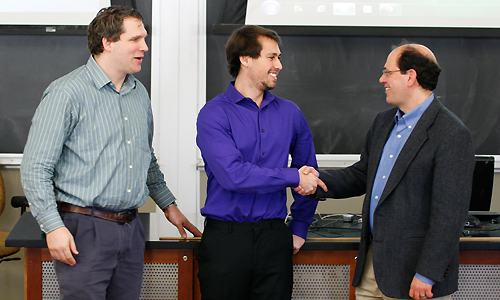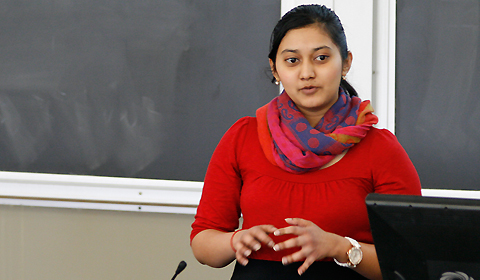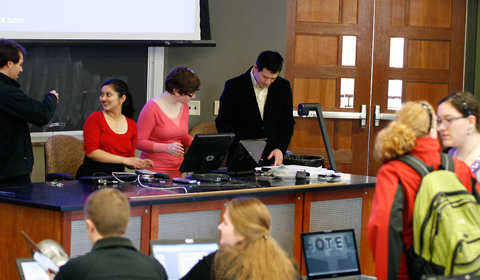By Jean Andrews
Physics & Astronomy
Austin Way ’14, HTC Engineering Physics, received top honors at the recent 6th Annual Society of Physics Student Research Conference at Ohio University. His talk, “Fabrication of Photovoltaics,” was voted Best Presentation by a panel of faculty judges from the Department of Physics & Astronomy.
Way was one of six undergraduate presenters who provided an overview of their individual research projects, ranging in scale from subatomic to galactic sizes, and applications from micro-scale devices to new semi-conductors. Competition was strong and each presenter was prepared to answer questions from the panel.
“We needed to articulate what we’ve learned, and why it’s important. The other talks at the conference were really interesting and well done, so it’s an honor to be chosen for this award,” Way explained.
Way has been investigating the feasibility of using plasma sputtering to build a complete solar cell by studying the electrical properties of the cells to determine stability and efficiency. He analyzed the samples under optical and scanning electron microscopes to observe the surface morphology and locate defects.
Way received undergraduate research support through a Hollings Scholarship, a two-year appointment awarded through the National Oceanic and Atmospheric Administration’s Office of Education. He is completing an HTC honors thesis about solar cell efficiency, under the direction of his thesis adviser, Dr. Martin Kordesch, Professor in the Department of Physics & Astronomy.
Senior Yashashree Jadhav ’14, HTC Astrophysics, was awarded honorable mention for her presentation, “The Search for Cataclysmic Variables using Pan-STARRS1.” One of her research goals is to find cataclysmic variables which are systems of close binary stars consisting of one mass accreting white dwarf and a donor companion star. The gravitational interactions between them give rise to quasi-periodic outbursts. Jadhav uses data from the Pan-STARRS1 telescope in Hawaii.
Jadhav conducted research as a summer intern at the Max Planck Institute in Heidelberg, Germany. Her project advisor was Dr. Niall Deacon, a post-doctoral fellow at the Institute. Her thesis adviser is Dr. Douglas Clowe, Associate Professor in the Department of Physics and Astronomy.
“This is my second year as a participant at the SPS research conference, and it’s been a great learning experience both times. Astrophysics is a fascinating field, and traveling last summer to Germany to do research was awesome,” Jadhav said.
Other presenters included Taylor Grueser ’15, HTC Astrophysics, who discussed “Replication of the Haynes Shockley Experiment.” The Haynes Shockley Experiment, first reported in 1948, demonstrated that diffusion of minority carriers in a semiconductor could result in a current. Grueser’s investigation focuses on mobility and recombination lifetimes of excess minority charge carriers to better understand semi-conductor materials and their possible applications. Grueser received support from the Summer Undergraduate Research Fellowship Program through OHIO’s Condensed Matter and Surface Science Program (CMSS.) Her thesis adviser is Dr. Martin Kordesch, Professor in the Department of Physics & Astronomy.
Max Camp’16, Physics, described ongoing research at the Edwards Accelerator Lab in his talk “Measuring the Cross-Section of γ + n → K° + Λ.” He participated in efforts by researchers to gain more insight into quantum chromo-dynamics. Camp received summer internship support from the Institute of Nuclear and Particle Physics (INPP) at Ohio University. His adviser is Dr. Kenneth Hicks, Professor of Physics and Astronomy.
Samantha Thrush ’15, HTC Astrophysics, presented, “Troubleshooting Water Emission Output from HITRAN Codes.” Thrush received a Research Experiences for Undergraduates (REU) internship sponsored by the National Science Foundation, where she spent her summer at the University of California at Davis, working under the direction of astrophysicist Matthew Richter. Her project involved simulating water emission spectra of the gas disc of the T. Tauri stars and the species of molecules that exist within the discs. Thrush’s adviser is Distinguished Professor of Physics Dr. David Drabold.
Helen Cothrel ’15, HTC Physics, described “Photolithography with a goal of investigating nanostructures.” Her focus on optical studies will allow her to fabricate micro-scale devices to study the electro-optical properties of nanostructures. Cothrel received support from CMSS’s Summer Undergraduate Research Fellowship Program. She works under the direction of Dr. Eric Stinaff, Associate Professor of Physics & Astronomy.
The Department of Physics & Astronomy faculty members view these endeavors as an important milestone for each presenter. “As undergraduates, they get an early start as researchers – to see what is involved in designing substantial projects, obtaining the skills, doing what is needed, and being able to describe their results. A research internship is solid foundation for learning by doing,” Department of Physics & Astronomy Chair Dr. David Ingram said.
More 2014 SPS Undergraduate Research Conference photos may be viewed on the Department of Physics & Astronomy’s Facebook page.






















Comments